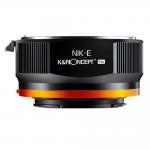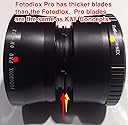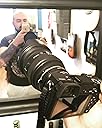
Nikon AI Nikkor F Mount Lens to Sony Alpha E NEX Mount Mirrorless Camera with Matting Varnish Design Compatible for Sony A6000 A6400 A7II A5100 A7 A7RIII
SKU: KF06.436
After upgrading to Full frame Sony Alpha A7 from cropped sensor Sony a6000 as a backup camera to my primary Nikon gears I was in a confusion state. I was thinking whether I should purchase all full-frame Sony gears or use NEX lenses in crop mode or get Metabones to adapt my Nikon gears. At last I paid my hard earned $22.99 for K&F Concept NIK(G)- NEX adapter and went out for Macro photography, used my Nikon 105mm/f2.8 Micro on A7. Results are awesome at least 80%. As there's no numbers on the aperture ring it's hard to know what could be the real aperture on the lens while sliding the ring on the adapter; I moved the slider 1/4 from the full open thinking it could be between f6-f9. But after checking in Lightroom I am guessing it was something like f13-f16, as pictures are bit dark.
After using it for couple of hours, I am satisfied with lens to adapter and adapter to camera connection, quite snug and no light leaking. full 5 star, maybe more, but not 5 as it's hard to know/guess the real aperture on the lens. But, I do believe after using it few more projects I would be able to guess the aperture of the connected lenses.
Adding couple of pics: Nikon Micro Lens with the adapter and a Macro shot using that lens on A7.
After using it for couple of hours, I am satisfied with lens to adapter and adapter to camera connection, quite snug and no light leaking. full 5 star, maybe more, but not 5 as it's hard to know/guess the real aperture on the lens. But, I do believe after using it few more projects I would be able to guess the aperture of the connected lenses.
Adding couple of pics: Nikon Micro Lens with the adapter and a Macro shot using that lens on A7.
18/09/2024
I own a number of legacy lenses that I use on my a6000. I also have a number of adapters from different brands. While all of them get the job done, K&F is one of my favorite. K&F seems to be a bit pricier than other brands but I like the look and feel of their adapters. Quality metal finish, sturdy feel and easy to use and remove.
If you aren't familiar with the FD locking mechanisms please spend some time understanding how FD lenses work (either through YouTube or having a veteran photographer show you). The locking mechanism can be tricky and mishandling can cause damage to the lens. After I figured out the FD mechanism, the adapter worked like a breeze. I highly recommend
If you aren't familiar with the FD locking mechanisms please spend some time understanding how FD lenses work (either through YouTube or having a veteran photographer show you). The locking mechanism can be tricky and mishandling can cause damage to the lens. After I figured out the FD mechanism, the adapter worked like a breeze. I highly recommend
15/09/2024
Great budget Nikon G to Sony E Lens Mount Adapter. Works without any problems. Smooth mounting both the front and back.
And yes you can mount Nikon F lens as well. This thing have a build-in aperture ring with 6 full F stops of adjustment from smallest to largest. If you have a F lens with aperture ring, set it at the locking position (smallest F stops) and use the build-in adjustment ring on the adapter to control aperture.
You get full TTL metering in A mode and M of course. Not sure about S or P since aperture is manual.
Build quality is quite good. All metal construction, including aperture adjustment ring.
I think the next upgrade would be a Speed Booster to make the lens switching even more worthwhile.
And yes you can mount Nikon F lens as well. This thing have a build-in aperture ring with 6 full F stops of adjustment from smallest to largest. If you have a F lens with aperture ring, set it at the locking position (smallest F stops) and use the build-in adjustment ring on the adapter to control aperture.
You get full TTL metering in A mode and M of course. Not sure about S or P since aperture is manual.
Build quality is quite good. All metal construction, including aperture adjustment ring.
I think the next upgrade would be a Speed Booster to make the lens switching even more worthwhile.
12/09/2024
1) All of my Zuiko lenses are sitting too far from the sensor - Infinity focus happens when their distance scales are at about 7 meters. This is not really an issue when manual focusing, but I can't rely on a lens barrel's Infinity stop. It's a good thing the Sony a6000 has Focus Peaking and Ficus Magnification - they are absolutely necessary for manual focusing at Infinity using these adapters.
2) All of my Zuiko lenses can be focused more closely than on an OM body. This somewhat compensates the Infinity-focus problem. :-)
3) All of my vintage zoom lenses lack the resolution that can be captured by the Sony a6000 24MP sensor. They are just soft, even in the center at f/8, even though they were mire than acceptable with film.
4) Only five of my Zuiko primes are up to the task: 50mm f/1.8, 50mm f/3.5 Macro, 55mm f/1.2, 200mm f/4 and 300mm f/4.5. The rest are too soft, wide open, but ridiculously better at f8. The 50mm f/3.5 Macro and the 200mm f/4 are spectacular with the Sony a6000 (at 77mm and 308mm equivalents).
5) The OM to E-mount adapter exacts about a 1/2-stop loss of speed from the vintage lenses, much as would any extension tube. It's not a problem, thanks to good high-ISO performance.
6) Many lenses made for digital sensors are designed to deliver the light as perpendicularly as possible - to avoid the CA (chromatic aberration) "purple fringing" seen with lenses that were designed for film. I'm getting a lot of CA in the corners of the frame, but it's easily fixed in Photoshop. Note: There's no CA by shooting at f/8 instead of wide open.
Lastly: I later bought a Fotodiox adapter and a Fotodiox Pro adapter for comparison and find them to be essentially identical in quality and function, so far, except the blades that engage the adapter to the camera body are about twice as thick with this K&F Concepts adapter and the Fotodiox Pro adapter, where the blades for this Fotodiox adapter are quite thin - which leads me to believe this K&F Concepts adapter (or the Fotodiox Pro adapter) would be the better choices when mounting a heavy lens (or perhaps any lens). Otherwise, the most significant difference is their weights. The aluminum and brass K&F Concepts adapter weighs 3.5 oz. The aluminum Fotodiox adapter weighs 3.2 oz. and the Fotodiox Pro weighs 3.1 oz. See photos...
All three adapters have a length of 33mm, from the body mount to the lens mount, and again, they all focus well short of Ininfity.
Again, the blades that engage the adapter to the Sony camera body are the same thickness for the Fotodiox Pro and the K&F Concepts, but are much thinner (for some reason) with the Fotodiox adapter. Oddly, they all feel the same when attaching lenses or when attaching to the camera body.
If I had to do it all over again and money were no object, I would get the Fotodiox Pro, due to its being the lightest of the three at 3.1 oz. vs. 3.2 and 3.5 oz and having thick blades, rather than skinny blades. But the K&F Concepts comes out on top for having the best price, the thick blades similar to the Fotodiox Pro, but weighing 3.5 oz. instead of 3.1 oz. I would avoid the Fotodiox adapter due to its thin blades, where attached to the camera body - they do not inspire confidence. Again, the blades are thicker with the Fotodiox Pro and this K&F Concepts adapter.
2) All of my Zuiko lenses can be focused more closely than on an OM body. This somewhat compensates the Infinity-focus problem. :-)
3) All of my vintage zoom lenses lack the resolution that can be captured by the Sony a6000 24MP sensor. They are just soft, even in the center at f/8, even though they were mire than acceptable with film.
4) Only five of my Zuiko primes are up to the task: 50mm f/1.8, 50mm f/3.5 Macro, 55mm f/1.2, 200mm f/4 and 300mm f/4.5. The rest are too soft, wide open, but ridiculously better at f8. The 50mm f/3.5 Macro and the 200mm f/4 are spectacular with the Sony a6000 (at 77mm and 308mm equivalents).
5) The OM to E-mount adapter exacts about a 1/2-stop loss of speed from the vintage lenses, much as would any extension tube. It's not a problem, thanks to good high-ISO performance.
6) Many lenses made for digital sensors are designed to deliver the light as perpendicularly as possible - to avoid the CA (chromatic aberration) "purple fringing" seen with lenses that were designed for film. I'm getting a lot of CA in the corners of the frame, but it's easily fixed in Photoshop. Note: There's no CA by shooting at f/8 instead of wide open.
Lastly: I later bought a Fotodiox adapter and a Fotodiox Pro adapter for comparison and find them to be essentially identical in quality and function, so far, except the blades that engage the adapter to the camera body are about twice as thick with this K&F Concepts adapter and the Fotodiox Pro adapter, where the blades for this Fotodiox adapter are quite thin - which leads me to believe this K&F Concepts adapter (or the Fotodiox Pro adapter) would be the better choices when mounting a heavy lens (or perhaps any lens). Otherwise, the most significant difference is their weights. The aluminum and brass K&F Concepts adapter weighs 3.5 oz. The aluminum Fotodiox adapter weighs 3.2 oz. and the Fotodiox Pro weighs 3.1 oz. See photos...
All three adapters have a length of 33mm, from the body mount to the lens mount, and again, they all focus well short of Ininfity.
Again, the blades that engage the adapter to the Sony camera body are the same thickness for the Fotodiox Pro and the K&F Concepts, but are much thinner (for some reason) with the Fotodiox adapter. Oddly, they all feel the same when attaching lenses or when attaching to the camera body.
If I had to do it all over again and money were no object, I would get the Fotodiox Pro, due to its being the lightest of the three at 3.1 oz. vs. 3.2 and 3.5 oz and having thick blades, rather than skinny blades. But the K&F Concepts comes out on top for having the best price, the thick blades similar to the Fotodiox Pro, but weighing 3.5 oz. instead of 3.1 oz. I would avoid the Fotodiox adapter due to its thin blades, where attached to the camera body - they do not inspire confidence. Again, the blades are thicker with the Fotodiox Pro and this K&F Concepts adapter.
10/09/2024
Works to connect manual pentax lens to a sony a6000. The amount of focal lenght and apature control is really stunning with this combo. Worth doing! Here is a picture of clouds. Really happy
28/08/2024
To be honest, I didn't expect much for the price, but wasn't ready to drop $100+ on the higher end adapters, even though I use a M-bones EOS to NEX adapter on nearly every shoot. I had dug up some old SSC Canon FD lenses of my dad's that looked to be in great condition and was eager to try them out on my Sony FS7.
When the adapter arrived, the first thing I noticed was very solid construction. It mounted to my FS7 with no issue. Not too tight, as I have experienced with some of the higher end adapters, but no play in it either. I have 3 FD lenses - a 50mm f/1.4 SSC, a 50mm f/3.5 Macro SSC, and 135mm f/3.5 SC. All three lenses mounted to the adapter with no problem. Again, not too tight, but no play either. The aperture lock ring works perfect.
What's to be seen is how long the adapter will last. But at such an affordable price, I'm not too worried about it.
When the adapter arrived, the first thing I noticed was very solid construction. It mounted to my FS7 with no issue. Not too tight, as I have experienced with some of the higher end adapters, but no play in it either. I have 3 FD lenses - a 50mm f/1.4 SSC, a 50mm f/3.5 Macro SSC, and 135mm f/3.5 SC. All three lenses mounted to the adapter with no problem. Again, not too tight, but no play either. The aperture lock ring works perfect.
What's to be seen is how long the adapter will last. But at such an affordable price, I'm not too worried about it.
27/08/2024
I'm a Blackmagic and Sigma/Canon lens user, I bought the SonyA7sII as secondary camera and I've used the Metabones before, but this little piece here just made my day, due to my field is Filmmaking I use all my lenses in Manual so I do not use the electronic communication, so Metabones is a waste of $400 bucks for me.
This is only my opinion, Sony camera is NOT my main camera and Metabones for me is over priced.
This is only my opinion, Sony camera is NOT my main camera and Metabones for me is over priced.
22/08/2024


















